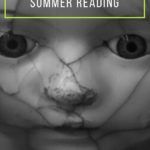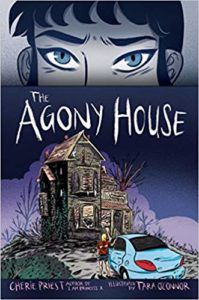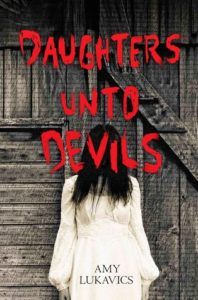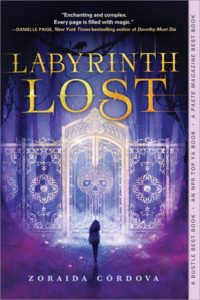Summer Scares is meant to introduce horror titles to more school and public librarians who may otherwise be less familiar with it, and by extension, these books become more familiar to readers interested in either dipping their toes in or deepening their knowledge of horror. A volunteer collaborative project with the Horror Writers Association, Library Journal, United for Libraries, and Book Riot, three categories each year honor three outstanding backlist titles. You can check out all of the winners for 2020, as well as have access to a wide array of resources to get to know the authors, the books, and for library staff, there’s even a librarian-created guide to how to use these books and develop programming around horror in your facility. What makes horror so fantastic is it’s not a genre. It’s a mood, meaning that it can be a part of any genre. The books selected in all of the categories highlight this perfectly, as will the books below and those which would make for excellent next reads. There’s horror historical, realistic horror, supernatural horror, and so many other flavors of scares, as well as levels of intensity from light chills to full-on blood and gore. There truly is some kind of horror book for every reader—but it takes understanding what horror is to find that right fit. As the leader for YA, I wanted to highlight this year’s incredible slate of titles. These YA horror books are wide-ranging, from a hybrid novel-graphic novel, to the start of a series about brujas, to a scary-as-hell book set upon the prairie. In addition, I’ve included a handful of books that have a similar chill level to them or contain some other similarities that will help expand your YA horror book reading this summer…and well beyond.
YA Horror Novels For Your Summer Scares
The Agony House by Cherie Priest and Tara O’Connor
This hybrid horror story blends text written by Priest with comics drawn by O’Connor. It follows Denise who, along with her mother and step-father, moves back to New Orleans after they leave post-Hurricane Katrina. The family has purchased a run down home and plan to rehab it and turn it into a bed and breakfast. But things aren’t going well in the renovation, and Denise becomes doubly concerned when she stumbles upon an old comic book in the home’s attic, drawn by a famous artist who’d gone missing decades before. She takes it upon herself to discover what may be lurking—and what that disappeared artist has to do with it. What makes this book special in addition to its format is that at heart it’s really about gentrification. Denise has to face the fact her family is attempting to make a profit off a gentrifying neighborhood and that those who’ve always lived in this less prosperous part of the city are being deeply impacted by people like her family. It’s spooky, smart, and a book that challenges expectations of what a horror book for teens can do. Perfect for readers who want their horror a little less gory and a little more chilling. What To Read Next:
Thornhill by Pam Smy: This hybrid novel, combining art and narrative, is about a haunted house and it’s set in two timelines: 1982 and 2017. It’s packed with the tropes of horror, including creepy dolls and ghosts, while remaining a deliciously modern gothic tale. A good pitch for this one might be Jane Eyre meets The Secret Garden. Smy uses a dark palate for the art, adding another level of the spookiness to the book. Like The Agony House, it’s not just about ghosts or haunted homes: it’s also a sharp look at the foster system in the ’80s in the UK and the ways its failed young people, and it explores bullying and trauma. Mooncakes by Suzanne Walker and Wendy Xu: This graphic novel is about a teen witch who helps out at her grandmother’s bookshop, where she often hands out spell books and assists in looking into supernatural occurrences in her small town. During one of those investigations, she stumbles upon her childhood crush and wants to not only rekindle feelings, but also to help him reclaim his power. Certainly not a haunted house story, what makes this a great read-alike is that it’s about family, about the ways history can tie a family and romantic relationship together, and it’s not especially gory. It’s about super-magical powers and spirits. Amity by Micol Ostow: Ten years ago, Connor and his family moved into Amity. Ten years ago, the house started scaring Connor, convincing him of things that may or may not have been happening. Convincing him that he needed to act upon an impulse. One that led to terrible consequences. Now, Gwen and her family have just moved into Amity. Immediately, weird things begin happening, and Gwen starts to feel like the house is haunted. She’s visited by Annie—and it’s Annie who convinces her to act upon some impulses she’s getting from Amity. It’s Annie who ties Connor to Gwen across those ten years. Ostow’s novel is a fun horror romp that fans of The Amityville Horror will dig, though no prior knowledge of that story are necessary. It’s bloody and creepy and it fits the bill for readers who love their horror with a side of exploration of whether it’s the thing at hand or something internal, some kind of madness.
Daughters Unto Devils by Amy Lukavics
The moment I read Lukavics’s debut, I knew this book was a sign of a writer who had something special. Lukavics is a queen of dark, sinister horror. Perhaps this book is best not talked about too in-depth, since the pitch for it is pretty much perfect: this is Little House On The Prairie meets horror. The house that the Verner family moves into is not good news, and what they experience is utterly terrifying. I still have nightmares about some of those scenes, and I read this book five years ago. This is one for those who aren’t faint at heart and who really want their bones rattled. What To Read Next:
Rotters by Daniel Kraus: Honestly, anything by Daniel Kraus in the YA horror realm would make for a great next read after Lukavics, as he’s writing similarly chilling, gut-churning, unflinchingly terrifying books. Rotters, though, has a special twist to it: it’s a book about a teen boy who takes up grave robbing in order to establish a relationship with his mysterious, aloof father when he’s forced to live with him following the death of his mother. Kraus writes about the seedy underbelly of the Midwest and about the secrets families keep hidden that can rise up and rear their ugly heads. The Waking Dark by Robin Wasserman: They called it Killing Day, when five people started taking out any and nearly everyone in their paths in small Oleander, Kansas. Of the five people who were killing, four were successful at taking themselves out in the end. Teen Cass was not. She lived. But is it really living if her parents desert her and she’s got a life sentence for committing a crime that she doesn’t know why she committed? Sure, it was an innocent child. But Cass is a child, too. A year later, things in Oleander aren’t better. In fact, things get worse when a tornado sweeps through town, killing more people. Causing more destruction. Now Cass is “free.” But she’s not really free. She’s still under rule of Oleander and it won’t be too long before she’s perhaps sentenced further. This is a very violent, destructive, and challenging-to-read story. But it’s not really about what happens or why it happens. It’s about the human reaction to devastation and corruption. It’s possible there’s an explanation for Killing Day and the events following, but it’s not necessarily believable either to the readers nor the characters. In many ways, that doesn’t matter. What matters is instead the question of what next? If everything is hell, do you try to get out or do you give in to your darkest desires and be motivated that way? Devils Unto Dust by Emma Berquist: It’s likely not a super huge coincidence these book titles are similar to one another, as the tone and feel of both are eerily reminiscent of each other. Set in west Texas in 1877, the story follows Willie as she has to find her father, as he’s stolen a load of money from McAlister. McAlister promises revenge if that money is not returned. The thing is: no one steps out of Glory alone. Outside of the gates are the shakes. The shakes are hungry, vicious, and will turn you into one of them in an instant. Willie has little money, but needs to hire herself a hunter to help her track down her father in another town. Enter the Garrett brothers. This book’s pitch is 28 Days Later meets True Grit and that’s the perfect description. Berquist’s zombie novel has the same feel as Lukavics, blending western and horror together in a compelling, absorbing way. Anything by Stephanie Kuehn (The Smaller Evil, Charm and Strange, and others): Kuehn is a master at dark psychological suspense, and while her storytelling is less external than Lukavics’s is in Daughters, the deeply haunting psyche explored in each will leave readers questioning their own realities.
Labyrinth Lost by Zoraida Córdova
Here’s a little insider talk: this book was on the short list for last year’s inaugural Summer Scares, but I didn’t want to include it before knowing that the final book in the trilogy would be available. Guess what comes out this summer? Now is the time to start your adventure with these powerful brujas. Alex is a bruja, but she hates having the power. She performs a spell to rid herself of her magic, but it goes horribly wrong. Her entire family disappears, and the only way she can get them back is to travel with a boy who she doesn’t like to Los Lagos, an in-between land. Along the way, we experience magic, witchcraft, a fiercely loving family, and a bisexual main character. This one feels especially tailored to young readers. That doesn’t mean it won’t appeal to adults, but this has all of the hallmarks of a YA book meant to reach teens in particular, and the fact that it’s a trilogy will keep readers hooked. The final book, Wayward Witch, hits shelves August 1. What To Read Next:
Undead Girl Gang by Lily Anderson: What about three girls, once dead and brought back to life, who are going to solve their own murders? This fun book is a bit like The Craft meets Veronica Mars, with wit, snark, and fun. Certainly lighter in tone than Cordova’s, it’s very likely the witchy elements are going to keep you reading. The Bone Witch by Rin Chupeco: Chupeco’s debut The Girl From The Well would also make a great next read, but The Bone Witch launches a series that explores necromancy and because it’s dark fantasy, it’ll definitely connect with fans of Labyrinth Lost. Tea has the power to raise the dead, but it comes with a price—so when she resurrects her brother and discovers that her witch capabilities differ from that of the rest of her family, she’s ostracized and left to find a place where she belongs. When she accepts her status as a bone witch, she’ll work to harvest her dark powers even more—but at what price? Five Midnights by Ann Dávila Cardinal: Lupe and Javier can’t stand each other, and yet they’ll have to because their job is as simple as it is complex: they need to solve a rash of murders taking place throughout Puerto Rico. But it won’t be easy (would it be, anyway?). This story doesn’t take place in the real world. It moves to the world of myths and legends, and together, Lupe and Javier have to find a way to discover who the real monsters are.
This summer, let yourself get scared with these books and so many other outstanding YA horror books.



